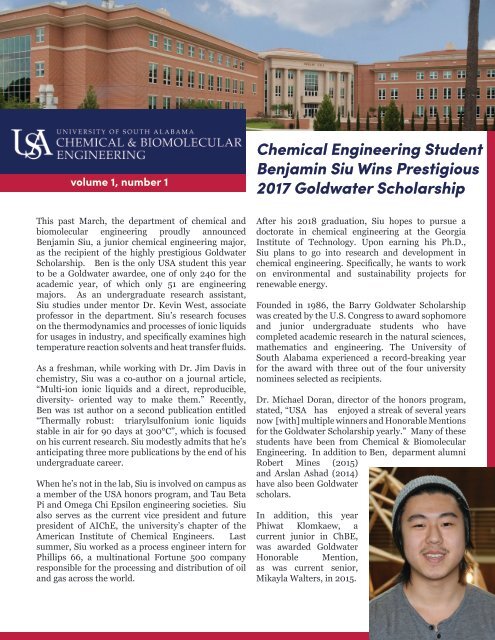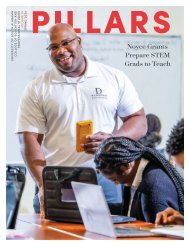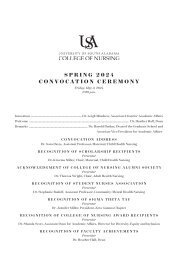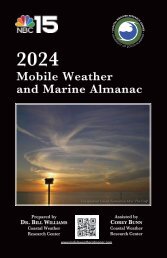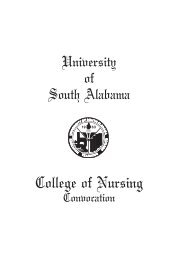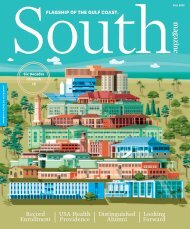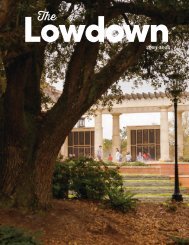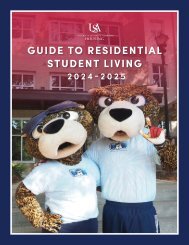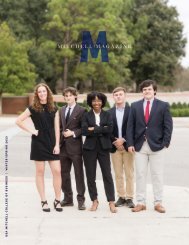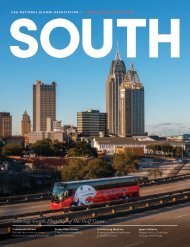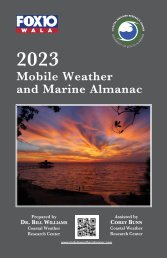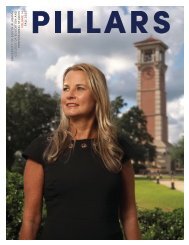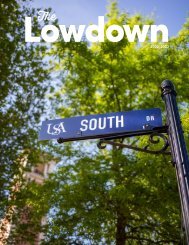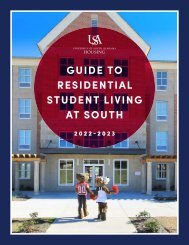chbenewsletterspr17
Create successful ePaper yourself
Turn your PDF publications into a flip-book with our unique Google optimized e-Paper software.
volume 1, number 1<br />
Chemical Engineering Student<br />
Benjamin Siu Wins Prestigious<br />
2017 Goldwater Scholarship<br />
This past March, the department of chemical and<br />
biomolecular engineering proudly announced<br />
Benjamin Siu, a junior chemical engineering major,<br />
as the recipient of the highly prestigious Goldwater<br />
Scholarship. Ben is the only USA student this year<br />
to be a Goldwater awardee, one of only 240 for the<br />
academic year, of which only 51 are engineering<br />
majors. As an undergraduate research assistant,<br />
Siu studies under mentor Dr. Kevin West, associate<br />
professor in the department. Siu’s research focuses<br />
on the thermodynamics and processes of ionic liquids<br />
for usages in industry, and specifically examines high<br />
temperature reaction solvents and heat transfer fluids.<br />
As a freshman, while working with Dr. Jim Davis in<br />
chemistry, Siu was a co-author on a journal article,<br />
“Multi-ion ionic liquids and a direct, reproducible,<br />
diversity- oriented way to make them.” Recently,<br />
Ben was 1st author on a second publication entitled<br />
“Thermally robust: triarylsulfonium ionic liquids<br />
stable in air for 90 days at 300°C”, which is focused<br />
on his current research. Siu modestly admits that he’s<br />
anticipating three more publications by the end of his<br />
undergraduate career.<br />
When he’s not in the lab, Siu is involved on campus as<br />
a member of the USA honors program, and Tau Beta<br />
Pi and Omega Chi Epsilon engineering societies. Siu<br />
also serves as the current vice president and future<br />
president of AIChE, the university’s chapter of the<br />
American Institute of Chemical Engineers. Last<br />
summer, Siu worked as a process engineer intern for<br />
Phillips 66, a multinational Fortune 500 company<br />
responsible for the processing and distribution of oil<br />
and gas across the world.<br />
After his 2018 graduation, Siu hopes to pursue a<br />
doctorate in chemical engineering at the Georgia<br />
Institute of Technology. Upon earning his Ph.D.,<br />
Siu plans to go into research and development in<br />
chemical engineering. Specifically, he wants to work<br />
on environmental and sustainability projects for<br />
renewable energy.<br />
Founded in 1986, the Barry Goldwater Scholarship<br />
was created by the U.S. Congress to award sophomore<br />
and junior undergraduate students who have<br />
completed academic research in the natural sciences,<br />
mathematics and engineering. The University of<br />
South Alabama experienced a record-breaking year<br />
for the award with three out of the four university<br />
nominees selected as recipients.<br />
Dr. Michael Doran, director of the honors program,<br />
stated, “USA has enjoyed a streak of several years<br />
now [with] multiple winners and Honorable Mentions<br />
for the Goldwater Scholarship yearly.” Many of these<br />
students have been from Chemical & Biomolecular<br />
Engineering. In addition to Ben, deparment alumni<br />
Robert Mines (2015)<br />
and Arslan Ashad (2014)<br />
have also been Goldwater<br />
scholars.<br />
In addition, this year<br />
Phiwat Klomkaew, a<br />
current junior in ChBE,<br />
was awarded Goldwater<br />
Honorable Mention,<br />
as was current senior,<br />
Mikayla Walters, in 2015.
New Special Topics Course<br />
Prepares Students for their<br />
First Job<br />
In the fall semester of 2016, the Chemical Engineering<br />
Department offered a new special topics course,<br />
Industrial Chemical Process Engineering (ChE<br />
490/590). This course, taught by Robert D’Alessandro<br />
integrates process safety into the curriculum and<br />
exposes students to the type of projects they may<br />
encounter in their first job. It is offered to senior<br />
undergraduate and graduate students studying<br />
chemical engineering.<br />
D’Alessandro uses his experiences at Evonik Industries<br />
as a basis for instruction. In the course he introduces<br />
the complete conceptual engineering design of an<br />
entire process, including process flow diagrams. The<br />
students then use this information and subsequent<br />
lectures to complete a detailed engineering design for<br />
a processing plant over a several month period. The<br />
main work product is an industrial document called<br />
the Piping & Instrumentation Diagram (P&ID).<br />
In addition, the students become familiar with<br />
equipment specifications, process hazard analysis,<br />
and emergency relief system evaluation.<br />
“The primary intention of ChE 490 is to teach<br />
students to use chemical engineering principles and<br />
fundamentals on industry applications and problems.<br />
The course focuses on the practical issues facing<br />
chemical process engineers working in a plant or in<br />
an engineering office. The course also emphasizes<br />
the integration of process safety and process design,”<br />
according to D’Alessandro.<br />
In most university classes the problems are black and<br />
white with definite solutions that student can find<br />
in, or arrive at, using their textbook. In Industrial<br />
Chemical Process Engineering there are many<br />
solutions that could work, but some are better than<br />
others.<br />
D’Alessandro worked at Evonik for 23 years and is<br />
proud of his career. He loves that Evonik feels they<br />
have a responsibility to the community and that they<br />
work hard to keep their site and the environment<br />
clean and safe.<br />
He also teaches two courses for the American Institute<br />
of Chemical Engineers on Inherently Safe Process<br />
Design. These courses are for experienced engineers<br />
seeking knowledge on advanced topics. These courses<br />
are held around the country and last three days.<br />
D’Alessandro is from the Bronx, New York and<br />
graduated with a B.S. in engineering from Fordham<br />
University in the Bronx and a B.S in chemical<br />
engineering from Columbia University in Manhattan.<br />
He received a M.S. in chemical engineering from<br />
Manhattan College.<br />
Teaching is not a job for D’Alessandro; it is a<br />
pleasure. If he could give chemical engineering<br />
students any advice it would be, “While at university,<br />
don’t underestimate the value that your chemical<br />
engineering fundamentals will have once you are a<br />
practicing engineer.”<br />
D’Alessandro says teaching this course is not very<br />
different from his time at Evonik where he mentored<br />
newly graduated engineers. Teaching is just another<br />
way to continue doing what he loves.<br />
D’Alessandro is retired from Evonik Industries in<br />
Theodore, Alabama where he held the position of<br />
Director of Process Technology.
Faculty Spotlight: Dr. Brooks Rabideau<br />
Dr. Brooks Rabideau recently joined the department<br />
of chemical and biomolecular engineering at<br />
the University of South Alabama as an Assistant<br />
Professor. His research area involves molecular<br />
dynamic simulations of complex systems, with an<br />
emphasis on ionic liquids. In the fall he taught the<br />
junior level Transport Phenomena I (fluids) course,<br />
and this spring he is teaching graduate transport.<br />
USA is one of the leading institutions in the United<br />
States in ionic liquids research. Rabideau will work<br />
with fellow researchers to characterize the properties<br />
and behavior of novel ionic liquid system. His current<br />
research studies molecular simulation to understand<br />
how modifications in chemical structure can influence<br />
properties of ionic liquids with application to biomass<br />
dissolution and separations.<br />
He previously participated in the Tailor-Made<br />
Fuels from Biomass program, which is an initiative<br />
by the German Federal Government to develop a<br />
complete process for converting waste biomass into<br />
combustible biofuels. He used molecular simulations<br />
to understand how ionic liquids, or molten salts,<br />
dissolved biomass and how modifications to their<br />
chemical structure could lead to improvements in the<br />
overall process.<br />
curiosity of his students. He enjoys testing his<br />
students’ physical intuition before revealing the main<br />
concepts, noting that their intuition is usually correct.<br />
He said the most difficult part of teaching is when the<br />
semester ends.<br />
“You form a lot of connections with the students<br />
through the class that you teach and want to see them<br />
continue to grow,” Rabideau said. “Hopefully, I’ll see<br />
some of these students again in later semesters.”<br />
Rabideau’s advice to incoming freshmen is, “Find out<br />
where your interests lie. College is a great opportunity<br />
to learn about new fields and explore new ideas. Be<br />
sure to take advantage of those elective classes.”<br />
Rabideau earned his B.S. in chemical engineering<br />
from Northwestern University in Evanston, Illinois,<br />
and his Ph.D. from the University of Texas at Austin.<br />
Before coming to USA, he completed two postdoctoral<br />
research fellowships at the RWTH Aachen<br />
University and Université Paris-Est, Institut Navier.<br />
Rabideau said he is very excited to provide additional<br />
understanding of ionic liquids. He also enjoys<br />
teaching as well as research, and values the natural
2016 - 2017 Scholarships<br />
Alabama Power Scholarship – Landon Heavner<br />
Hargrove Scholarship - Arianjel Hernandez<br />
Raburn Scholarship – Albaraa Mando<br />
Mitsubishi Scholarship – Jennifer Arrington<br />
Parish Scholarship – Jimmie McGehee<br />
Chevron Scholarship – Jeremy Hurst<br />
Goldwater Scholarship - Benjamin Siu<br />
Tau Beta Pi Fellowship - Mikayla Walters<br />
Reece/Rose Miller Scholarship – Gerald Duck<br />
Keith Harrison Scholarship – Caleb Barlow<br />
Laura Prine Scholarship – Ashley Koichi<br />
Stallworth Scholarship – Johnathan Anderson<br />
Stallworth Scholarship – Lauren Bassler<br />
Huddleston Scholarship – Troy Orwin<br />
Dhawan Scholarship – Amanda Brown<br />
Dhawan Scholarship – Christopher Jordan<br />
Dhawan Scholarship – Katherine Frangos<br />
Dhawan Scholarship – Kevin Cooper<br />
Dhawan Scholarship – Mattie McGill<br />
Congratulations Scholars!<br />
“Intellectual growth should commence at birth and cease only at death.”<br />
Albert Einstein<br />
In memory...<br />
William Crews Askew Sr.<br />
Professor of Engineering 1940 - 2017<br />
Harold Vernon Rodriguez<br />
Professor of Engineering 1932 - 2016<br />
The University of South Alabama<br />
Department of Chemical & Biomolecular Engineering<br />
150 Jaguar Drive, Shelby Hall 4134<br />
Mobile, AL 36688<br />
Ph: (251) 460-6160<br />
southalabama.edu/colleges/engineering/chbe/<br />
This newsletter created by Tideline Agency, managed by communication seniors.


